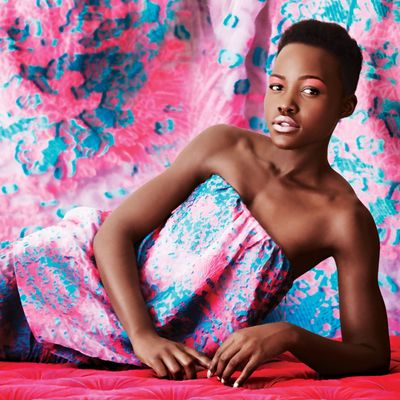
It was well into the audition process for 12 Years a Slave when Steve McQueen began to despair. He’d seen over a thousand actors for the role of the long-suffering Patsey, and no one quite had the “majestic grace” he thought the part required. By the time he watched the tape sent in by an unknown Kenyan actress named Lupita Nyong’o, he’d started to question his own judgment—“I just kind of rubbed my eyes in disbelief and needed someone else to confirm what I was seeing.” McQueen showed the audition to his 14-year-old daughter. Her response: “Wow. Who is she?”
So it was that Lupita Nyong’o found herself where she is, which at this particular moment is the NoMad Hotel, sipping verbena tea, sleek in black pants and black sweater, and sitting with legs and hands crossed politely as a driver waits outside and the lunch staff scours the pantry for gluten-free bread. “I haven’t always been gluten-free,” Nyong’o explains in a measured tone, after scanning the menu and coming up short. “I’ve done it for maybe nine months.” Which, like carrying a baby, is roughly the amount of time it could take a lovely young woman who lives in Brooklyn with a roommate from school to morph, via a team of publicists and stylists and handlers, into a Bona Fide Star. Just back from the awards circuit in L.A. (the SAG and Critics’ Choice Awards, which she won; the Golden Globes, which she didn’t), Nyong’o, 30, was this year’s standout fresh face, floating gracefully down a succession of red carpets in a series of bold-colored, eye-catching, sophisticated gowns (she shares a stylist with Michelle Dockery of Downton Abbey). On March 2, she may very well take home the Oscar for Best Supporting Actress, but in the meantime, she’s perfecting the role of the grateful, gracious ingénue nominee.
That is to say, her ability to both land her first feature-film audition after drama school and get nominated for it is “not a badge of honor” but only a lucky break; her director is “very good at keeping us on point”; her co-stars are “incredible, all exceptional artists, and very dedicated to their craft”; while on set, “egos are checked at the door, and everyone’s about the work”; her current whirlwind life is “stressed but blessed—I mean, I couldn’t have dreamed this up”; and her goal for the future is to “just be in the moment, fight to stay in the moment.” All of which makes her a publicist’s dream and ensures that, whatever may come of the Oscars, Nyong’o is not going to screw this moment up.
And in some ways it’s a moment she’s particularly equipped to handle, having grown up in a prominent Kenyan family. The second of six children, Nyong’o was born in Mexico City, where her father, who had been fighting for democracy against Kenya’s then-autocratic regime, was teaching political science at the Colegio de México and hiding out after his brother had disappeared under unusual circumstances. “His car was found on the ferry in the town he lived in with a pair of his shoes and no sign of him,” Nyong’o says. Worried that he might be the next one to go missing, her father relocated, figuring that “no one would look for a Kenyan in Mexico.” Nyong’o was born shortly thereafter and, in the Kenyan tradition of naming a child after what’s happening at the time of his or her birth, was given the name Lupita, a diminutive of Guadalupe. “Every single laundromat, grocery store, everything is called Lupita in Mexico.”
When Nyong’o was less than a year old, her parents moved back to Kenya, where her father is now a senator representing Kisumu County, her mother is the managing director of the Africa Cancer Foundation, and her cousin Isis is one of Africa’s most successful women, according to Forbes (“We don’t really know what she does; she’s like the Chandler of the family”). She describes her childhood as “middle class, suburban,” but adds, “It felt very normal to me, but ‘normal’ to me might be very different from ‘normal’ to you. I don’t know what ‘normal’ is.”
She attended an all-girls school, playing many sports poorly (“Soccer, hockey, rounders, netball, touch rugby—they could do without me, to put it mildly”), watching American television (“Step by Step, Fresh Prince of Bel Air, Hangin’ With Mr. Cooper, Full House—I watched a lot of sitcoms, as you can tell”), and acting in school plays, the first of which was Oliver Twist. “I was a passerby. I had five words: ‘Coming down the street, there.’ That was it. But I had a backstory for my character. I decided I was going to be a man, so I borrowed my brother’s suit, my dad’s briefcase. I don’t know why I decided to be a man—I think it was more interesting.” At age 14, she auditioned for Kenya’s national repertory theater, Phoenix Players, and was cast as Juliet. At Hampshire College, which she attended because “it’s a matter of course for Kenyans in middle-class families to study abroad,” she says she was not yet “in a position to admit I wanted to be an actor, but I knew that I wanted to be involved in that world. America was a good place to go.”
Nonetheless, her first months in America were a shock. “I thrive on structure,” she says. “I find my freedom in structure. It was very hard to adjust to an individualistic and very liberal system. I mean, my upbringing, I would iron my clothes every night. I would plan what I wore the night before, and then I would iron it. That’s just the way my mom raised us. Then I got to Hampshire, where clothing is sometimes optional and all this kind of thing. I was mortified.” She raises a perfectly arched brow and cuts into her sandwich with a knife and fork.
Home in Kenya one summer, Nyong’o worked as a production assistant on the set of The Constant Gardener, where she got to know Ralph Fiennes. “He asked me what I wanted to do with my life, and I very timidly admitted that I was interested in being an actor. He sighed and said, ‘If there’s something else that you want to do, do that. Only act if you feel you can’t live without it.’ It wasn’t what I wanted to hear, but it was the thing I needed to hear.” After a few more jobs behind the camera, she applied to Yale School of Drama. Several weeks before graduating, before she even had an agent, her manager asked her to put herself on tape for 12 Years a Slave—the first time she’d ever tried out for a feature film. A week later, she was invited to meet the casting director in Los Angeles. A week after that, she flew to Louisiana, where the movie would be shot, to read for McQueen. He knew she’d be his Patsey as soon as he saw her in person. “I mean, she was just amazing,” he says. “I looked at her and thought, ‘She’s almost like Grace Jones.’ ”
Before she even knew she had the part, her life was already starting to feel surreal: After the audition, McQueen invited her to a dinner where she met Michael Fassbender, and later they all went dancing. Nyong’o had only just gotten back to New Haven and was dragging a rug outside (“I wanted to bask in the sun and take in the last 24 hours, wrap my head around what had just happened”) when she got a call from an unlisted number. It was McQueen offering her the role. “I sat on the pavement,” she says, “immediately terrified and intimidated by the entire thing.” Six weeks later, she was back in New Orleans rehearsing scenes. “I whispered in her ear, ‘Let it rip, go for it,’ ” says McQueen. “Michael Fassbender came up to me after, and I remember him saying, ‘I better get my shit together.’ ”
Patsey may be the type of character made noble by her suffering, but Nyong’o’s performance is raw, unmitigated, a marvel of mainlined emotion, as unflattering and powerful as that can be. “I think she amplified the humanity, but there’s a certain kind of beauty to it, there’s a certain kind of openness,” says McQueen. “You know, there’s been a lot said about dark-skinned black actresses and the limitations they have within film. Well, I just hope that directors and other creative people have the idea of putting her in great and interesting projects, because she’s extraordinary.”
Since 12 Years a Slave, she’s become one of the faces of Miu Miu, filmed the upcoming action-thriller Non-Stop with Liam Neeson, watched live from her hotel room as she was nominated for an Oscar (“I had a very good cry with my best friend, and then we had a dance party, just me and him”), met most of her professional idols (“The checklist: Emma Thompson, Oscar Isaac, Jared Leto, Leonardo DiCaprio, Meryl Streep, Julia Roberts, Kerry Washington, Jennifer Lawrence, Cate Blanchett, Oprah”), and had her first run-in with the paparazzi a few days ago on her way home from L.A. “I don’t know who they were waiting for, but they definitely chased me down, which is a startling, disturbing experience,” she says as her driver navigates the frigid Manhattan streets on his way to the Brooklyn Museum, where Nyong’o plans to see the Jean Paul Gaultier exhibit. “I did not expect it. I went into flight mode.” Nor did she imagine that she’d practically become a national hero in Kenya, where one Nairobi church reportedly held a thanksgiving Mass in her honor and the president sent out a tweet to congratulate her on the nomination. “There are so many highlights that are no longer highlights,” she says evenly. “I’m living a very swollen life.”
Fresh though her fame may be, she knows enough to be deliberate about it. Even with the most innocuous details, she treads carefully. She doesn’t want to talk about her morning routine, doesn’t want to talk about her father’s politics, and doesn’t want to pull back the curtain on what meetings with her stylist are like. “I don’t know why, but I like to keep that part of it very intimate and very small.” From acceptance speech to talk show, she tends to repeat the same stories, as charming as they are (“I said, ‘Daddy, do you know Brad Pitt? I’m going to be in a movie with him!’ And he said, ‘I don’t know him personally, but I’m glad you got a job.’ ”). Her official Twitter account notes that it’s “run by Team Lupita”; tweets directly from her (marked “LN”) are few and far between. Once at the museum, she appreciates a quote about Gaultier that mentions his “wit and irreverence” (“That’s my kind of guy”), but when we get to the room of bondage-inspired clothing—arguably Gaultier’s wittiest and most irreverent work—she clams up. Did she ever rebel as a kid, do anything at all naughty or unexpected? “There’s this cough syrup called Linctifed, and it was red and it was delicious. I went and I drank the whole bottle of it, and then I replaced it with water. I got into a lot of trouble for that.”
Of course, Nyong’o can be forgiven for trying to have some control over her fame. “I can’t imagine what it would be like to be thrust in the spotlight in this way,” says co-star Sarah Paulson. “The only way, I think, to keep your feet screwed into the ground is to stay close to yourself. And she’s wise to do it. There is a reserve there, a wariness. She ain’t no dummy.”
Since the frenzy of awards season, Nyong’o says, “I’ve been in a bubble. I haven’t been out much. I haven’t gotten used to being recognized.” More than that, “I was blissfully ignorant of the magnitude of the project I was in or what it was going to mean for the world.”
Now she’s learning. In one room of the exhibit, as she’s marveling at a massive black-and-white hat (“Why oh why don’t we wear hats like that? It reminds me of My Fair Lady”), she’s timidly approached by a pretty young woman with long dreadlocks.
“Hello,” the woman says in hushed tones. “Are you Lupita?”
Nyong’o turns to face her. “I am.”
Suddenly the woman seems overwhelmed with emotion. “I thought you were, but I didn’t want to say it too loud. I saw you in the elevator. Thank you so much for your work. I just had to acknowledge that you were here and really say thank you for how much hope you provide for me.”
“Okay,” Nyong’o says, a bit uncertain, a bit aloof, but warming into this newest of roles. “Thank you. Thank you so much.”
Photographs by Erik Madigan Heck. Styling by Rebecca Ramsey. Set design by Andrea Huelse for Art Department; Makeup by Nick Barose at Exlusive Artists Management using Giorgio Armani Lip Maestro in #400 and Giorgio Armani Lip Maestro in #500; hair by Ted Gibson at Ted Gibson Beauty.
*This article originally appeared in the February 17, 2014 issue of New York Magazine.
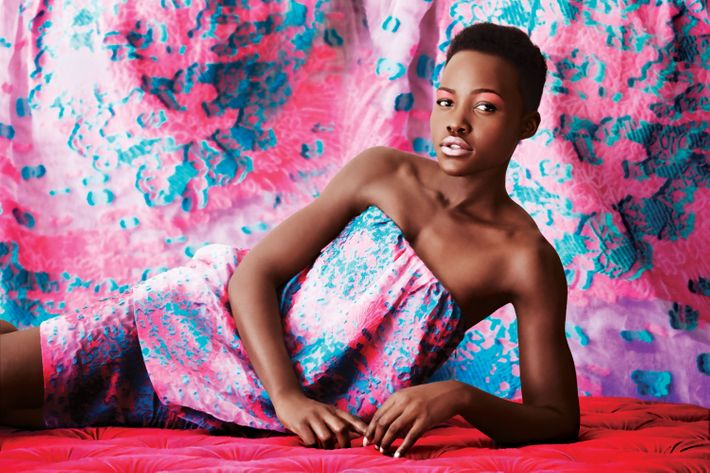
Top and skirt, Giorgio Armani.
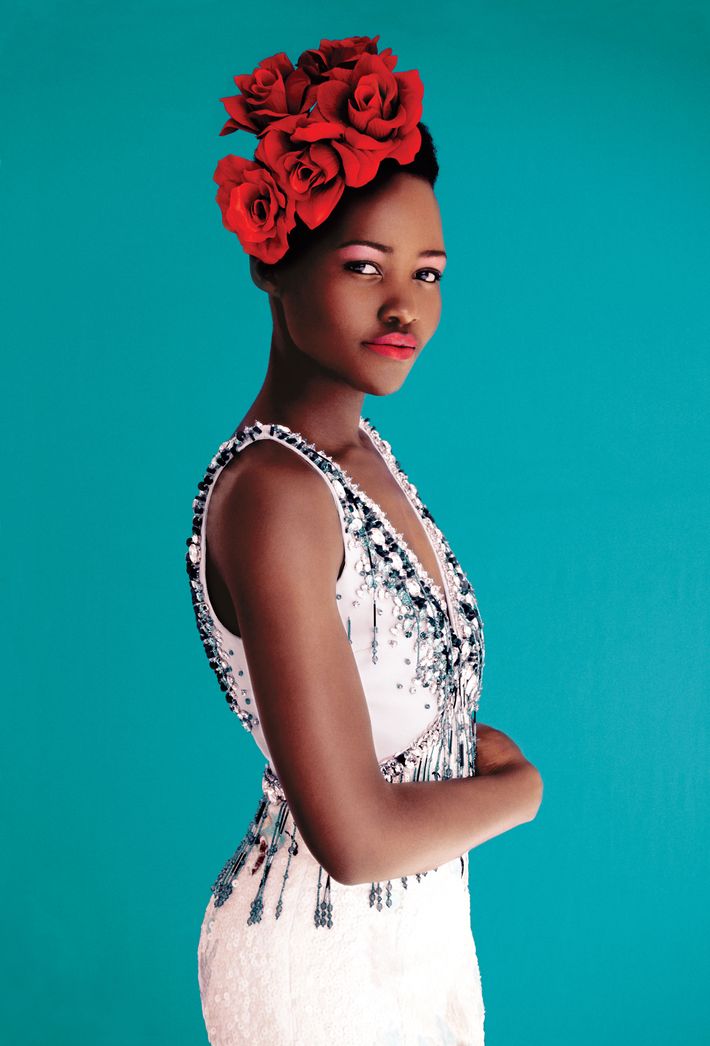
Dress, Miu Miu.
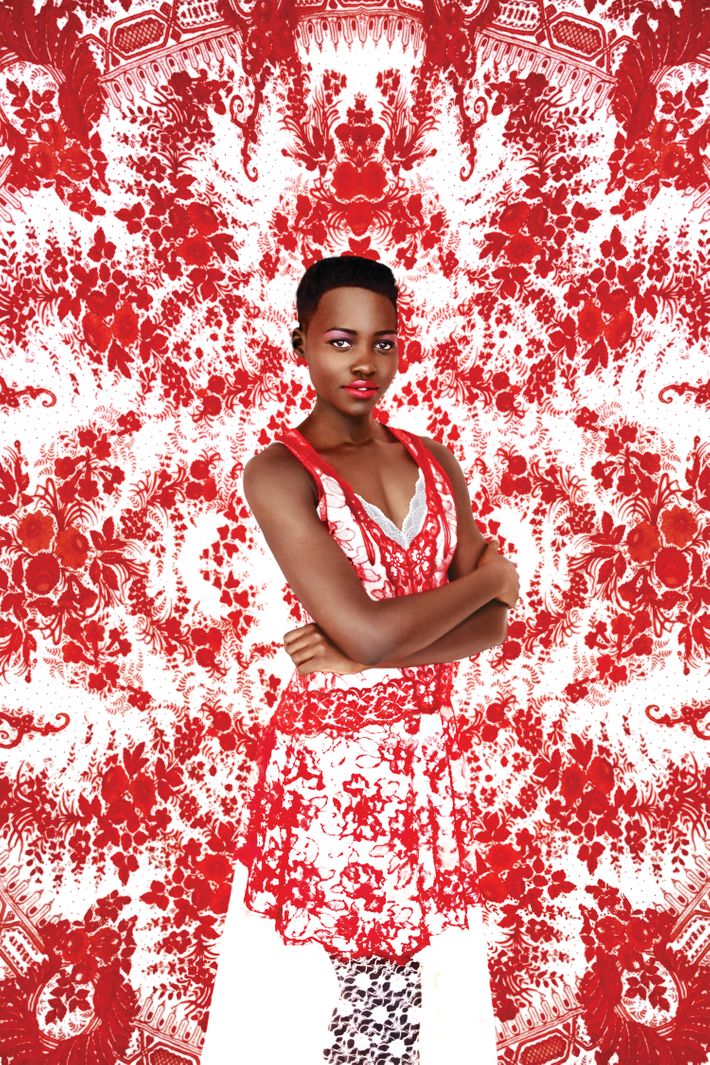
Dress by Stella McCartney.
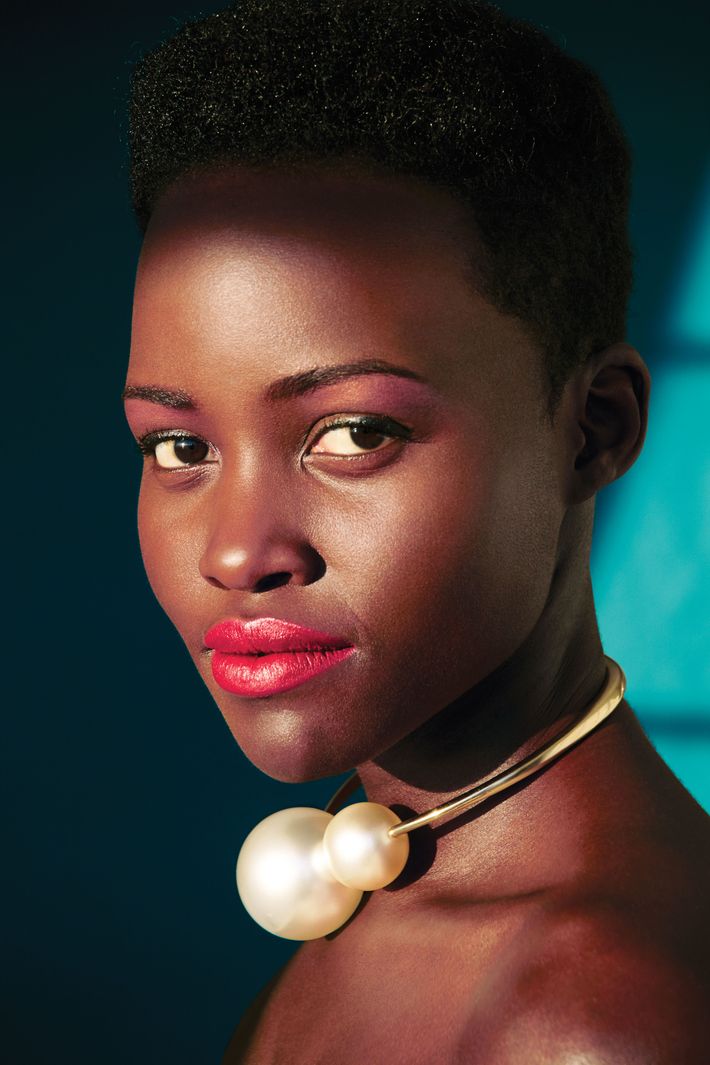
Necklace, Chanel.
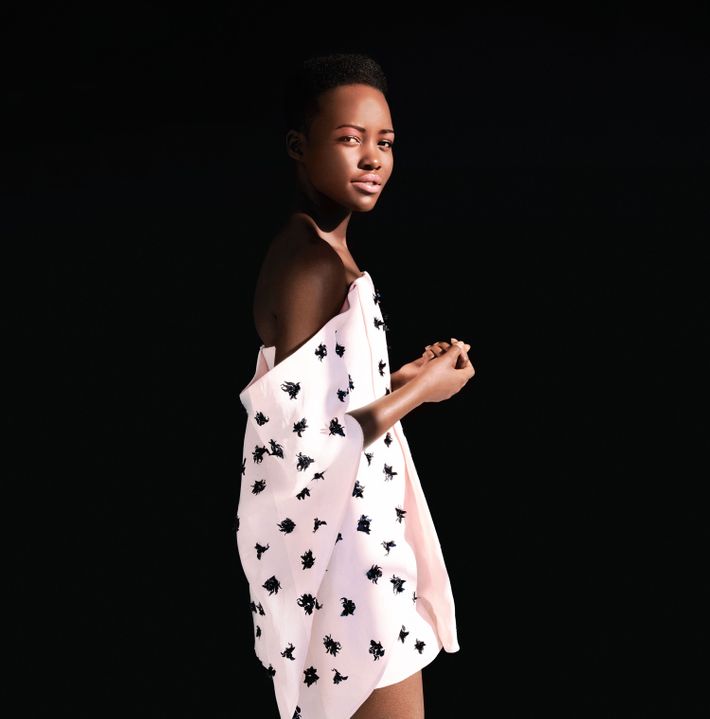
Dress by Balenciaga.
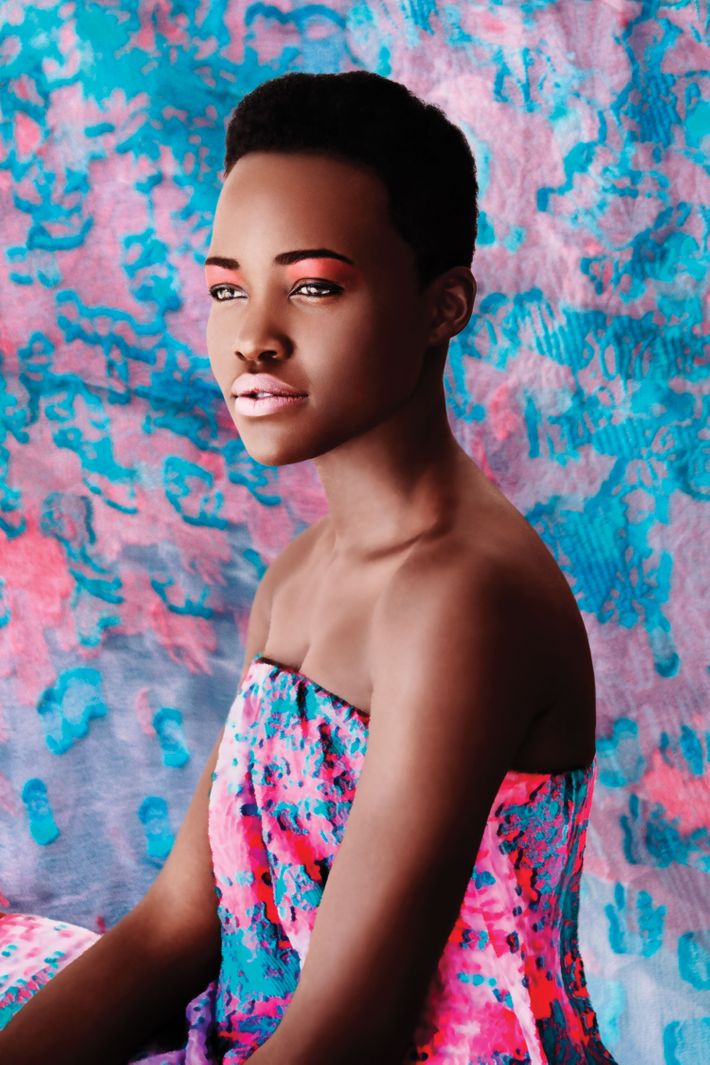
Top and skirt, Giorgio Armani.




